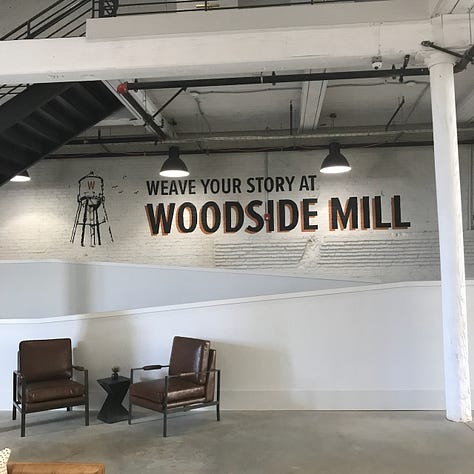From the Archives: Pat Buchanan's South Carolina Problem
Trump wants to slap an additional 10 percent tax on all imported goods. His advisers tell us it would bring textiles back to South Carolina. But times are better now (better even than in 1996).
This post on Trump’s proposed 10 percent tax on imported goods contains many good arguments on why it’s an atrocious idea. Since Nikki Haley recently called attending to this bad idea, the post includes how it might affect South Carolina as it actually exists and how Trump adviser Stephen Miller imagines it might bring the good old days back, concluding with “the MAGA faithful don’t see the machinations behind the scenes. All they see is Miller talking about how amazing it will be for South Carolina to tumble backward to a more primitive state of development.” That sent me looking for the WSJ op-ed I wrote in advance of the 1996 Republican primary in South Carolina, where Pat Buchanan’s campaign did in fact “wreck on the shores of South Carolina.” The South Carolina Piedmont bears some resemblance to the Italian version, with an economy built on water-powered textile mills that developed into a region of precision machinery and manufacturing. Since I wrote this article, Charleston, including its port, has also become a trade powerhouse.
Yankee writers tend to think of Southerners as poor, backward souls who wave Confederate flags, worship their ancestors, and secretly long for the return of Jim Crow. Pat Buchanan is a typical Yankee writer.
And unless he either changes his message or gets an enormous turnout of anti-abortion voters, his campaign will wreck on the shores of South Carolina—and rightly so. Judging from his rhetoric, he has no idea what state he's in.
Buchanan rolls into South Carolina preaching protectionism, bashing multinational corporations, and condemning companies that move their plants. He sells an economic policy based on stasis, on the idea that the best economy is one in which nothing changes.
In other words, he's pushing nostalgia for the days when South Carolina was poor. If he'd been in charge, he would have made sure it stayed poor.
For the historically inclined, Buchanan can’t heap enough praise on 19th-century protectionism, the bane of Southerners. The Solid South voted Democratic not just because of Abe Lincoln but because its farmers desperately wanted to sell in international markets, and the Republican economic policies blocked them.
“The first practicable step in the way of restoring prosperity to the farmers, and to all classes of the people, is to overthrow the Republican party, with its unjust tariff laws,” wrote North Carolina Congressman John S. Henderson in 1890. Southern farmers needed “the widest markets in the world,” and Southern Democrats promised voters they'd fight for free trade.
Southerners also know that free trade doesn’t produce a sucking sound, pulling all jobs to the cheapest labor. Otherwise, every job in America would have moved South long ago. There are, after all, no trade barriers between Mississippi and Michigan.
Some jobs did move, of course—including arch-protectionist (and major Buchanan backer) Roger Milliken’s textile company, which left New York in 1954. But mostly the Southern economy has grown by trading with the world, and increasing the economic pie. Buchanan’s despised multinationals have been a huge part of the story. America exports its image out of the Deep South, whether beamed by Cable News Network or bottled by Coca-Cola. And Buchanan’s nostalgia for Big Steel rings hollow in the region than gave birth to Nucor and the minimill.



Everyone, including Bob Dole, who campaigned there on Tuesday, knows about the BMW plant in Greer. But foreign investment in the Upstate—the northwestern region that includes Greenville and Spartanburg—was old news by the time the car maker arrived. Throughout the 1960s, a host of mostly Swiss and Austrian precision machinery companies had located in the area, often spinning off entrepreneurial employees' startups. Michelin, the French tire maker, hit the state in the late 1970s, and remains its largest employer. The large Bi-Lo grocery chain, headquartered in Greenville and employing some 4,000 South Carolinians, is owned by a Dutch concern. Overall, the state ranks third in the percentage of private-industry employees working for nonbank foreign-owned firms, at 8.1 percent in 1993, behind Hawaii and Delaware. (By comparison, in California, the figure is 5 percent, just over the national average.) Foreign companies directly account for more than 100,000 South Carolina jobs, and exports are booming. Although some small textile towns make for good Buchanan campaign backdrops, help wanted signs are everywhere in the Upstate. Unemployment in heavily Republican Greenville County stands at less than 3 percent.
South Carolina is actually a more natural place to sell Steve Forbes's dynamic message of “hope, growth, and opportunity” than Buchanan’s dreams of a never-changing economy. Harvard Business School professor Rosabeth Moss Kanter, who conducted regional focus groups on attitudes toward international business, found Buchananites—but mostly in Boston. In South Carolina, she writes in World Class, “people are highly positive about the global economy.” Republican pollster Linda DiVall says that when she was with the Gramm campaign, their South Carolina polls showed people favoring free trade, including NAFTA and GATT, by a margin of 50 percent to 38 percent.
In fact, the foreign businesses that have settled in South Carolina shed some important light on Buchanan-style policies. Kanter quotes managers who praise the “flexibility” of Carolina workers compared to European ones. A long-time observer notes that Swiss immigrants settled partly because “there are so many things available in this country that you’ve got to go outside of Switzerland for. Here you can go from state to state and not have to stop to show your passports.”
Flexible workers, and work rules. A borderless world... International companies came to South Carolina to get away from Buchananism, European-style. It’s unlikely that their new home will adopt the American version—much as Yankee pundits might like that.







I believe that was the same campaign where Buchanan told people they should buy American cars but it came out he personally owned a Mercedes.
I would love to have your opening plenary speech from the first Mars Society conference at CU Boulder. Please post it somewhere, thanks!
–Steven Jones RMMS